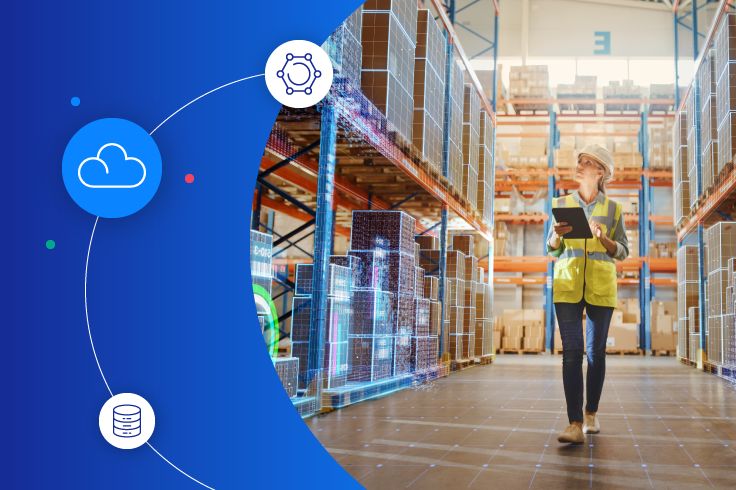Cloud Computing in Retail: Benefits, Market Insights, and Future Predictions

The demands of today’s consumers change faster and faster, with fresh trends surfacing on social media daily. Retailers must swiftly adapt to meet consumers’ needs and embrace emerging technological advancements. It’s no wonder numerous companies opt to transition their IT infrastructure to the cloud in an effort to boost customer experience and returns on technology investment. Yet, these benefits are just the tip of the iceberg when it comes to the advantages of cloud computing for retailers.
In this article, we’ll explore:
- The influence of cloud adoption on the retail industry.
- Key trends shaping the adoption of cloud technology in retail.
- Benefits that cloud computing offers to retailers.
- Types of cloud computing in retail and how each type caters to the needs of modern retailers.
- The future of cloud computing in retail.
Cloud Adoption in the Retail Industry

Cloud services are revolutionizing the retail sector by addressing diverse needs, including cost reduction in infrastructure, storage, and computing. They facilitate real-time access to operational and inventory data, resulting in heightened data security, enhanced user experience, improved inventory management, effective disaster management, and increased profitability.
One of the key 2024 IT trends highlighted by Gartner is the move to industry cloud platforms. These industry-specific cloud-based solutions are invaluable for retailers, aiding in marketing automation, client management, and scheduling. By consolidating point-of-sale and human resources management into a unified platform, retailers not only save time and money but also enhance the overall effectiveness of their store operations.
Moreover, Gartner predicts significant growth across all segments of the cloud market in 2024, with public cloud end-user spending projected to reach $679 billion. Furthermore, by 2027, more than 70% of enterprises are expected to utilize industry cloud platforms to bolster their initiatives.
Retail Market Overview
In June 2022, consumers witnessed a 40-year inflationary high. However, consumption didn’t slow down as much as the experts predicted, according to Deloitte.
E-commerce platforms and online retail channels are gaining prominence within the global retail sector. Numerous retailers are adopting an omnichannel approach, seamlessly blending both offline and online channels. As of 2022, the worldwide retail market achieved sales surpassing $27 trillion, projected by Statista.
Trends in retail for 2024 focus on embracing customer loyalty initiatives and delivering an omnichannel experience. The move towards online retailing reflects changing consumer preferences and a growing reliance on digital platforms for shopping convenience. The integration of omnichannel models enhances customer experiences and enables retailers to stay up-to-date with the changing trends.
The spike in online shopping would not be possible without cloud computing, as it provides the scalable infrastructure and advanced data analytics essential for optimizing e-commerce operations and meeting the demands of the modern, chronically online recipients. Cloud computing holds significant potential for retailers, offering numerous benefits.
10 Benefits of Cloud Computing in Retail Industry

1. Inventory Optimization
Efficient inventory management poses one of the most common challenges for retail businesses, particularly for large organizations with multiple store locations. Cloud computing offers a wide range of tools, enabling real-time stock checking and management, providing a comprehensive view through cloud architecture and advanced analytics. Predictive inventory forecasting reduces issues related to stockouts and overstocking.
Cloud computing provides a panoramic view of the entire chain’s inventory without the need for manual synchronization of each store. Furthermore, data is accessible anytime and anywhere.
2. Improved Data Security
With a continuous stream of daily customers, protecting data becomes paramount. Cloud computing efficiently manages sales, stock, and customer information with care. It's now widely acknowledged that the cloud offers a high level of data security thanks to advanced and continuously developed tools, comparable to local servers. This dispels concerns about storing sensitive and valuable data on the cloud, as it ensures robust security measures, including encryption and firewalls.
In the area of cloud data security challenges, service providers play an essential role. They shield confidential business data from threats like network infiltration, cyberattacks, or ransomware.
3. Better Customer Experience
A positive and impactful customer experience can make or break customer loyalty. Cloud computing aids retailers in collecting and utilizing data for trend analysis and understanding customer behavior and interactions critical for gaining a competitive edge. Cloud-based point-of-sale systems ensure quick checkouts.
Analyzing consumer behavior, such as purchase history, enables specific predictions and the development of a better customer journey. Moreover, a larger scale of data assists in devising marketing strategies and pricing to attract more customers. The use of cloud data analytics makes retail businesses more secure, reliable, and future-proof.
4. Disaster Recovery
While cyberattacks pose a threat to sensitive data, local server failures, power outages, or natural disasters can also lead to data loss. Manual data recovery in such cases can be time-consuming and sometimes impossible. With cloud disaster recovery models, retail companies can securely store data and access it anytime without the worry of data loss. Backup and disaster recovery can be initiated from any location and automated to ensure business continuity.
Cloud computing supports disrupted business operations while being scalable, cost-effective, and reliable.
5. Dynamic Pricing and Margin Management in Retail
Pricing plays is critical in retail success. Cloud computing analyzes not only customer data but also competitor data. With information on prices from other retailers, historical trends, margin implications, and more, prices can be automatically adjusted for online and in-store purchases. Manual price management is time-consuming and prone to errors.
Cloud computing in the retail industry provides accurate results and saves time for data analytics. The right solution can extract data from multiple sources and facilitate analysis.
6. Accurate Personalization
Cloud computing delivers a wide range of continuously developed and improved tools, making it an invaluable asset for customizing customer experiences. By effectively handling inventory and shipping, cloud computing gains access to customer buying history and order tracking, regardless of the order date.
Real-time access to customer data enables retailers to offer highly personalized recommendations, exclusive offers, and other loyalty-enhancing initiatives. Cloud computing can even help retailers welcome new customers with personalized messages or share enticing sales when they step into the store.
7. Omnichannel Order Fulfilment
Omnichannel marketing strategy ranks among the top trends for 2024 in retail. Reaching out to customers through multiple touchpoints to deliver a clear, personalized message is key to strengthening brand-customer relationships, and cloud computing is a must for implementing these initiatives. Cloud technology solutions consolidate data from various sources to create insights that develop into consistent and convenient marketing strategies, improving the overall shopping experience.
8. Scalability
Retail is susceptible to seasonal changes, promotions, and even weather conditions. Equipped IT systems must be prepared for this dynamism and offer scalability. Cloud-based models automatically adjust the resources to match usage, scaling up to meet customer needs or down to reduce costs for retailers. This solution empowers retail companies to adapt their operations to the ebbs and flows of demand. Moreover, flexible payment options help increase or decrease computing usage as needed, further aiding business expansion.
9. Supply Chain Visibility Management
A well-managed supply chain is critical for retail success. A simple mistake or delay can create a snowball effect and cause significant damage. Cloud computing offers integration between different aspects of retail processes, fortifying operations by providing better visibility and advanced application support.
Cloud technology in retail results in improved inventory levels and fewer stock-outs while enabling businesses to collect valuable data on inventory. Using this solution, companies can analyze each step of the supply chain, record relevant data, and assist retailers in optimizing their processes.
10. New Product Manufacturing
To entice consumers, offering enticing prices and discounts is no longer enough—the strongest brands offer new products that meet consumer demands.
Cloud computing, with its advanced data analytics, contributes to understanding the changing needs of consumers based on their feedback or reviews. Retailers can quickly identify gaps in their offerings and create new products with desired features. Cloud computing equips retailers with the necessary tools to assess current and upcoming trends and create new products based on informed decisions and timely responses.
What Are the Types of Cloud Computing in Retail?
Cloud computing employed within the retail sector encompasses both cloud computing services and environments.

Retail Cloud Computing Services:
- Infrastructure as a Service (IaaS): In this setup, a third-party provider furnishes cloud storage, virtual servers, and related infrastructure components.
- Platform as a Service (PaaS): This model entails the provision of software and hardware tools, such as compilers, debuggers, or source code editors, by the cloud solution vendor.
- Software as a Service (SaaS): Widely adopted, SaaS involves the delivery of ready-to-use comprehensive solutions hosted and managed by the cloud provider.
Retail Cloud Computing Environments:
- Public Cloud: In this arrangement, a single provider delivers cloud computing resources, with pricing models adjusted to actual consumption, allowing for effective cost optimization accessible for purchase by any retailer via a subscription to the public cloud.
- Private Cloud: Within a private cloud setting, cloud computing services are exclusively provided to a single dedicated customer through a private internal network, affording enhanced control and customization options, and ensuring the highest data security based on physical separation from other tenants.
- Hybrid Cloud: Combining on-premises data storage with private or public clouds, this option offers retailers the advantages of both solutions
The Future of Cloud Computing in Retail
Retail is evolving far beyond the traditional boundaries of ERPs, CRMs, and supply chain management. Cloud computing is fundamentally reshaping the enduring retail industry, enabling adaptation to dynamic markets. Even small brick-and-mortar retailers now have access to a diverse range of tools to enhance communication. Furthermore, cloud technology can mitigate the risk of miscommunication and foster a promising outlook for the future of the retail sector.
Elevating customer experience, implementing sustainability initiatives, and facilitating contactless shopping are among the trends revolutionizing the utilization of cloud technology in retail.
Looking ahead, the future of cloud in retail holds the promise of even greater innovation, with advancements such as AI-driven personalization, augmented reality shopping experiences, and seamless integration across online and offline channels poised to further change the industry.
Revolutionize Your Retail Business with Cloud Computing
Cloud computing is revolutionizing various industries, and retail is no exception. It's not surprising, given that cloud technology provides retailers with numerous opportunities to enhance customer service, streamline internal operations, and elevate supply chain management to new heights. Furthermore, embracing cloud computing can confer a significant competitive advantage.
Today, an increasing number of retailers recognize the critical importance of cloud migration. With the pace of technological advancement, there's no time to waste – seize the opportunity and get started with Comarch Cloud Services today!
Comarch Cloud products and services offer a myriad of options to assist retailers in building, upgrading, managing, and maintaining their business applications. Featuring 6 cloud regions, flexible financing options, and unparalleled cloud expertise, it's no wonder that the world's leading brands entrust their applications to us.
Don't settle for less – delve deeper into our offerings and opt for Comarch Cloud to optimize your business efficiency. Let us empower your retail success!
Key Takeaways:
- Cloud adoption is revolutionizing the retail industry. By providing cost reduction, real-time data access, enhanced security, and operational efficiency, it is reshaping traditional retail practices.
- Industry trends are propelling the adoption of cloud technology in retail. Omnichannel retailing, customer loyalty initiatives, and other emerging trends drive the implementation of cloud computing, empowering retailers to effectively meet evolving customer demands.
- Cloud computing offers a multitude of benefits for retailers. These advantages include inventory optimization, enhanced data security, and dynamic pricing, among others.
- Retailers have access to various types of cloud computing services to suit their needs. They can choose from Infrastructure as IaaS, PaaS, SaaS, and other cloud options to meet their specific requirements.
- Exciting advancements signal innovations in cloud technology for retail. AI-driven personalization, augmented reality shopping, and sustainability initiatives promise enhanced customer experiences and operational efficiencies.

